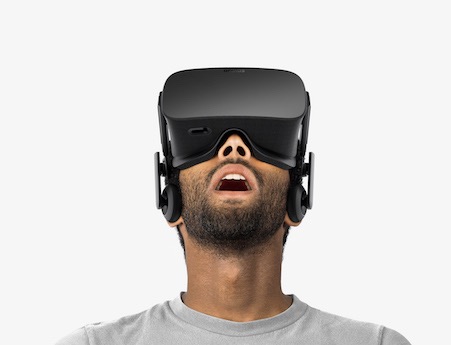Fox Futurist: VR’s Time Has Finally Arrived

The smarter way to stay on top of broadcasting and cable industry. Sign up below
You are now subscribed
Your newsletter sign-up was successful
Universal City, Calif. — Ted Schilowitz was all set to deliver a presentation on virtual reality here May 25, but when he first took the stage, he did something odd — and hilarious — instead.
The technology futurist for 20th Century Fox asked the 300-plus attendees at the Hollywood IT Society’s (HITS) “Holly-wired” conference to pull out their smart phones, trade with their neighbor, and then put their (new) phones away. “See how long you can hold out [checking them],” he quipped.
Not everyone obliged, but almost everyone laughed. And soon they were nodding when he made the connection between everyone’s reliance on their smart phones today to the reason why virtual reality’s time has finally arrived.
Related: Facebook Buys VR Audio Company
“The thing you just swapped isn’t just a device, it’s a robot you’ve surrendered part of your brain functions to,” he said. Nobody remembers phone numbers anymore, not when a smart phone exists. Directions? Who needs them? Instant access to the collective information mankind has put together is at your fingertips, and we can’t spend more than a few minutes away from these devices, Schilowitz said, pointing to stats showing that smart phone owners go a total of two hours during their waking hours without it.
And when people began asking for their phones back, Schilowitz’s point was made: today’s constantly tech-connected consumer is ready for the next iteration. And that's virtual reality.
“For the first time in history I think we’re really, really ready to take on the next technology,” he said. “This has been tried before, but [VR] wasn’t ready, and human nature wasn’t even close to ready. We were barely using pagers.”
The smarter way to stay on top of broadcasting and cable industry. Sign up below
Related: IMAX Looks to Take VR to Theaters
Virtual reality has been around for a very long time, and Schilowitz emphasized that point by putting up a mid-1990s magazine cover with a headline screaming that virtual reality had hit mass-market appeal. What’s different today is that the cost barrier for entry for any consumer is small, the content commitment is huge, and consumers — finally — are ready for it, he said.
Thirty years worth of progress has been made in the last three when it comes VR technologies, Schilowitz estimated, and he sees it every time he gets on a plane, puts on a VR headset, and — inevitably — begins passing around the extra he brought after people ask him about it.
“You’ve all done home-based [virtual reality] in a way,” he said, pointing to people who’ve owned a motion-enabled gaming system like the Nintendo Wii. “Your grandmother has bowled in her living room. What’s new is that the next generation will find VR so innate, so comfortable, they’ll treat it like just a new tool.”
Much like that smart phone in your pocket.
